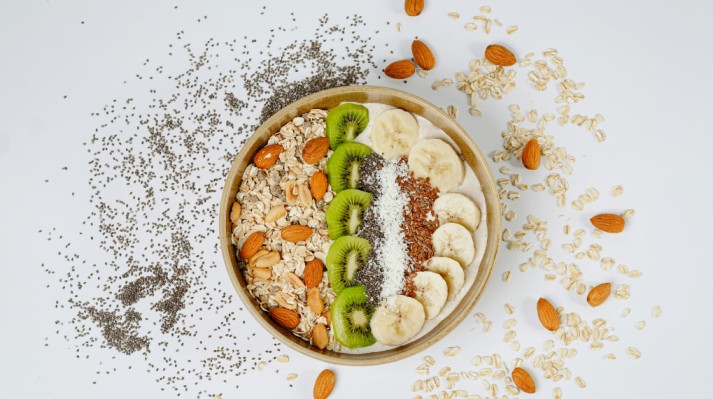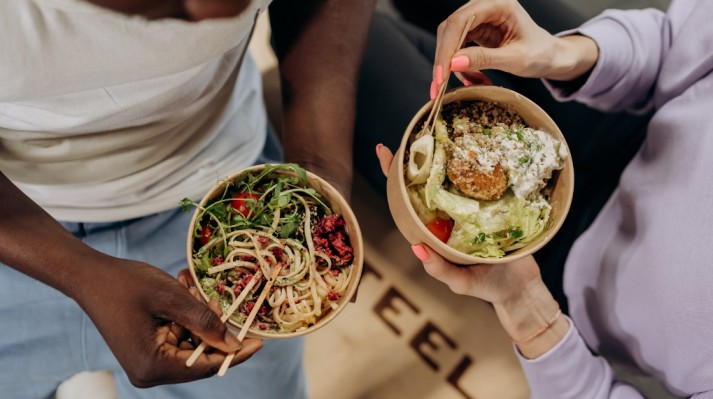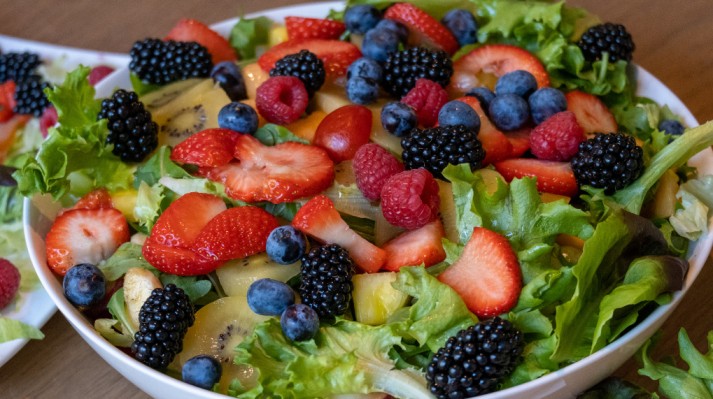While working out, it’s just as important to make sure your body gets the nutrients it needs. Maintaining a healthy diet that helps your muscles heal, boosts your strength and stamina, and keeps fat loss in check is important to get the most out of your gym workouts.
A healthy, balanced diet includes protein to rebuild fibers, carbs to give you energy, and healthy fats to help your body function well. All of the nutrients in your diet also aid muscle development. With the help of vitamins and minerals, you can reduce inflammation, which is also necessary for healthy living. It is important to link the intensity of your workouts with what you eat for benefits that last. All of these things are applicable whether your goal is to lose weight, build muscle, or stay fit generally.
This blog will cover useful meal plans tailored to your fitness goals so that your diet works as hard as you do at the gym. Ready to dig in?
Why Diet Matters for Gym Goers?
What you consume directly affects how well you work out and how quickly your body heals later. To get the most out of your workouts, nutrition is more than just giving your body food. It’s also about improving your strength, endurance, and muscle repair.
- How to Fuel Your Workouts: Carbohydrates give you energy for exercise and give you the strength to get through challenging workouts. Fats can be used as a second source of energy, especially during longer workouts.
- Supporting Muscle Repair: Protein is an important part of muscle repair because it helps rebuild and strengthen muscle fibers after a workout. When you eat enough protein, your body can quickly fix the small tears that happen during exercise, which keeps your muscles from breaking down.
- Increasing Endurance: Micronutrients, such as vitamins and minerals, help the body use energy, tighten muscles, and stay hydrated. If you don’t eat enough, you get tired quickly, which makes your workouts less effective.
A healthy, well-balanced diet works with your workouts to help you reach your goals, whether they are to build muscle, lose fat, or get stronger in general.
Key Nutrients for a Gym Workout Diet Plan
To maximize the benefits of your workout, you must eat the right nutrients. Here are the key nutrients you should focus on in a diet plan for gym workouts.
Protein for Muscle Growth & Repair:
Protein is important for muscle growth, and during exercise, it also makes you stronger. It also helps the body function effectively, including producing hormones and keeping your immune system healthy.
The following are some excellent sources of protein:
- Chicken, eggs, fish, and lean beef are animal-based foods.
- Tofu, beans, chickpeas, and quinoa are plant-based foods.
- Greek yogurt, cottage cheese, and protein shakes are all easy to get.
Aim to eat protein throughout the day, but especially after a workout, to help your muscles recover.
Carbohydrates for Energy:
Carbs are the body’s main source of energy, as they help you do intense workouts and aid recovery. They fill up glycogen stores so that your efficiency stays high.
Different Types of Carbs:
- Complex carbs, like brown rice, oats, sweet potatoes, and whole-grain bread, give you long-lasting energy and are best eaten before you work out.
- Fruits, honey, and white rice are all good sources of simple carbs that can give you a quick energy boost before or after a workout.
- Having carbs and protein together after a workout helps muscles heal faster.
Healthy Fats for Hormone Balance:
Fats are essential for hormone Balance, lowering inflammation, and providing you with energy that lasts. They also help the body absorb nutrients.
The best sources of fat are
Healthy fats can be found in avocados, olive oil, nuts, and seeds.
- Salmon, mackerel, flaxseeds, and chia seeds are all excellent sources of omega-3s.
- Healthy fats in the right amounts give you steady energy that doesn’t make you feel tired.
Hydration and Electrolytes:
Water is important for keeping your energy up, keeping your body temperature steady, and keeping you from getting dehydrated while you work out.
- Electrolytes (magnesium, potassium, and sodium) help the body:
- Maintains your muscle functioning.
- Minimizes cramps and tiredness
- Retains fluids in your body.
- Coconut water, bananas, leafy veggies, and electrolyte drinks (low-sugar kinds) are the best places to replenish your fluid levels in the body.
Pre-Workout Nutrition:
When you eat the right foods before you work out, it provides your body with the fuel it needs to function properly. A pre-workout nutrition meal before a workout gives you energy, keeps your strength up, and helps your muscles function better.
The best time to eat a well-balanced pre-workout meal is one to two hours before working out. This period will help your body process the food and release energy. A small snack 30 minutes before can help you feel better quickly.
Here are some meal ideas to stick with before hitting the gym:
- Oats with bananas are a great way to get steady energy because they have a good mix of complex carbs, fiber, and natural sugars.
- Peanut butter on whole-grain toast is a nutritious option that gives you protein, fiber, and healthy fats.
- A protein shake with fruits is an ideal mix of carbs and protein that are quickly broken down to fuel performance.
- Also, staying hydrated is important. Drink water before your workout to stay refreshed and avoid getting tired.
Post-Workout Nutrition:
After your intense gym session, your body needs the right foods to heal and rebuild. Protein and carbs are the two most important things to eat after a workout, as mentioned, because they help repair muscles and fill up energy stores.
To get the most out of your recovery and muscle repair, eat a healthy meal within 30 to 60 minutes of your workout. This is the window of time when your body gets to absorb nutrients the best.
The following are some of the best meals to have post-workout:
- Grilled chicken and brown rice are a delicious meal and an easy way to get a steady supply of energy because they contain both lean protein and complex carbs.
- A protein shake with a banana is an effortless post-workout snack to make and helps you heal quickly.
- Cottage cheese with berries helps your muscles heal by giving them protein, vitamins, and natural sugars.
Pro tip: Adding healthy fats, like avocado or nuts, can help keep your muscles healthy and your hormones in check over time. Also, don’t forget to drink water! Electrolytes and water help the body heal the fastest.
Sample Gym Workout Diet Plan (Indian or Global):
Fueling your workouts with a personalized meal plan ensures optimal energy, recovery, and long-term progress. Below is a balanced Indian or Global diet plan that aligns with workout intensity and fitness goals.
| Time | Meal Example |
| Early Morning | Soaked almonds + warm water with lemon |
| Breakfast | Oats + boiled egg whites OR smoothie bowl |
| Mid-Morning | Fruit + handful of nuts |
| Pre-Workout | Whole-grain toast + peanut butter |
| Post-Workout | Protein shake + banana OR grilled chicken |
| Lunch | Brown rice + dal OR grilled tofu + veggies |
| Evening Snack | Sprouts salad OR Greek yogurt + nuts |
| Dinner | Grilled fish/chicken/tofu + steamed veggies |
Additional Tips:
- Hydration is key: Drink plenty of water throughout the day.
- Adjust portions based on your fitness goals (weight loss, muscle gain, or maintenance).
- Include variety: Rotate meals to prevent boredom and ensure a diverse nutrient intake.
- Listen to your body: Your energy levels and recovery will guide dietary tweaks.
This meal plan balances protein, carbs, and healthy fats to match workout needs while keeping nutrition simple and effective.
Common Diet Mistakes Gym-Goers Make:
Many gym-goers make mistakes with their diet that slow them down, even when they mean well. Here are some mistakes that most people make:
- Not Eating Meals: Skipping meals can make you feel tired, cause you to lose strength, and make it harder to do your workouts. Consistent nutrition helps people grow and get better.
- Too Much Protein and Not Enough Carbs: Protein is important for building muscle, but carbs restore glycogen and give you energy. If you don’t eat enough carbs and too much protein, you may get worn out and lose your stamina.
- Not Drinking Enough Water: Drinking enough water is important for nutrition, performance, and muscle function. Dehydration can make you feel weak, give you headaches, and make you dizzy. Electrolytes (sodium, potassium, and magnesium) help keep the body’s fluid balance, so don’t forget about them!
- Not Adjusting Calories to Reach Goals: Whether you want to lose weight, add muscle, or keep the weight off, the number of calories you eat needs to match the intensity of your workouts. Not eating enough can make it harder for muscles to recover, and eating too much without planning can make you add fat instead of lean muscle. Hence, a balanced calorie-deficient diet is necessary.
How to Avoid These Mistakes:
- Make sure your meals have the right amount of protein, carbs, and good fats that your body needs.
- Schedule meals around workouts to make sure you get enough fuel and time to heal.
- Drink water throughout the day to stay refreshed. Change how many calories you eat based on your fitness goals and how hard you work out.
- Making small changes to your food can help you get the most out of it and keep your body working at its best.
Customizing Your Diet Based on Goals:
Customizing a diet plan that aligns with your fitness goal is important. Your aim may be to lose weight, gain weight, or build muscle. Here is how you can customize a diet plan to achieve your fitness goal.
For Muscle Gain:
To help muscles repair and grow, individuals who are building muscles need to eat more protein and calories. A nutrient-dense diet and strength training work well together to help you make gains.
- Eat more lean meats, eggs, dairy, tofu, beans, and protein shakes to get more protein.
- Eat more calories by eating healthy fats and complex carbs like brown rice, quinoa, and oats.
- Eat frequently, possibly two to three hours apart, and eat small, healthy meals.
- Eat protein and carbs right away after your workout to help your muscles heal.
For Fat Loss:
For fat loss, a calorie shortage is important, but for muscle loss, keeping your protein intake high is essential. Moderate carbs give you long-lasting energy that helps you work out.
- Chicken, fish, cottage cheese, tofu, and beans are all lean sources of protein that play a crucial role in aiding weight loss.
- Whole grains, veggies, and sweet potatoes are good sources of complex carbs in moderation.
- Healthy fats (in small amounts), such as olive oil, nuts, seeds, and avocado, are also ingredients that aid weight loss.
- Electrolytes and water help digestion, so make sure you take a sip all day.
- To keep your hunger in check, don’t go too long without eating.
For General Fitness:
Getting the right amount of macronutrients is important for maintaining strength, energy, and endurance without losing too much weight or muscle.
- Balanced protein, carbs, and fats will supply all the nutrients you need to maintain energy levels all day long.
- Portion control means eating based on how active you are and when you feel hungry.
- Regular times for meals are necessary for the energy that runs throughout the day.
- And as usual, make sure you’re drinking enough water to help digestion and healing.
- No matter what your exercise goal is, eating right will help you reach it!
Supplements: Are They Necessary?
Supplements can aid gym performance and recovery, but they should never replace a healthy diet. Food is prioritized over supplements because whole foods supply vital nutrients that supplements cannot imitate.
Common Gym Supplements:
- Whey Protein: Convenient, high-quality protein for muscle repair and growth, especially post-workout. It is particularly beneficial in situations where whole-food protein is not readily available.
- Creatine: Renews muscle ATP (energy source) to boost strength, power, and recovery. Most people who choose to consume it find it to be well-studied and safe.
- BCAAs: Support muscle recovery and decreased discomfort, but a high-protein diet usually offers enough to help you get through the day.
- Multivitamins: This supplement can help complete micronutrient shortages in the diet, especially for people with restrictive diets or strenuous training.
Real Food First, Supplements Second:
- Essential nutrients and fiber in whole diets maintain long-term health beyond exercise.
- Focus on protein, carbs, healthy fats, vitamins, and minerals in balanced meals.
- Use supplements as a backup when whole food intake is insufficient.
Get Your Gym Workout Diet Plan from QUA Nutrition
Optimizing gym performance, recovery, and long-term progress requires a balanced diet. Aligning nutrition and workouts ensures long-term results for muscle gain, fat loss, or fitness. Prioritizing whole foods, hydration, and meal timing helps you maximize training while avoiding diet mistakes. Real food is best, but supplements can help.
Qua Nutrition creates customized diet plans for athletes, fitness enthusiasts, and health enthusiasts. Our expert advice from a dietitian nutritionist ensures nutrition matches lifestyle needs, helping clients reach fitness goals sustainably. Smart, informed diet choices can fuel progress as hard as gym work! Contact us now to book an appointment with our nutritionist to customize it according to your needs.









